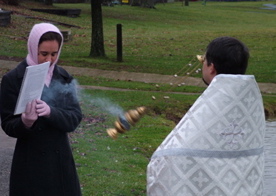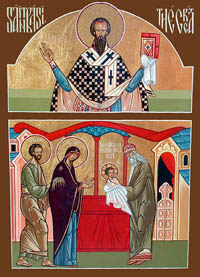Warning: Undefined property: linknotes::$are_links in
/var/www/vhosts/basil/kbsite/blog/wp-content/plugins/linknotes.php on line
73
For some reason, this year I’ve seen twice mentioned the tradition of Saint Basil’s bread. I should get excited over a tradition associated with my name day and namesake, but I confess, the fact that everyone keeps referring to it as Vassilópita has dampened my interest. It makes it sound like some exotic, ethnic custom that is completely irrelevant to me as an Orthodox Christian in the United States.
Why must people use a Greek word when an English translation is easily used? Certainly, some words really do not translate well. Most of our liturgical words for the various types of hymns fall into this category. Yet, “prokeimenon” seems gratuitous when “gradual” will do just fine. Some people complain that, because they do not come from a liturgical background, this is just as foreign as “prokeimenon,” preferring a Greek liturgical word to an English liturgical word. I, for one, am not anxious to see perfectly good English liturgical terminology fade into obsoletion simply because somebody thinks Greek is better. Sounds like the people Ss. Cyril and Methodius were facing back in the day.
As far as the names for hymns go, I think it would be a good idea to append the word “hymn” to most of these. At least then, people would know they were hymns; it would not be so distancing for inquirers. Also, it would eliminate the pernicious plural problem: “troparion hymns” would be correct; no one would have to learn that “troparion” is made plural as “troparia.” (As an added benefit, I would have one less big, red, liturgical hot-button if the pernicious plural problem were dismissed.)
Besides, when everyone defaults to using Greek, it’s not easy to see why we don’t just go back to “Doxa Patri kai etc.” and “Sophia! Proskomen!” and all the rest.



